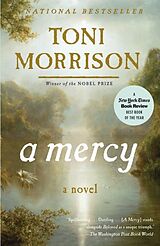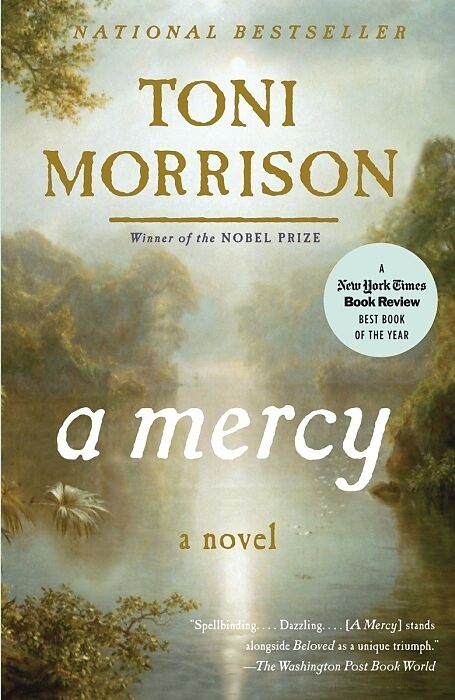A Mercy
Einband:
Kartonierter Einband
EAN:
9780307276766
Untertitel:
Englisch
Genre:
Romane & Erzählungen
Autor:
Toni Morrison
Herausgeber:
Knopf Doubleday Publishing Group
Anzahl Seiten:
208
Erscheinungsdatum:
01.08.2009
ISBN:
978-0-307-27676-6
Zusatztext A NEW YORK TIMES BOOK REVIEW BEST BOOK OF THE YEAR Spellbinding. . . . Dazzling. . . . [ A Mercy ] stands alongside Beloved as a unique triumph. The Washington Post Book World A Mercy conjures up the beautiful, untamed, lawless world that was America in the seventeenth-century with the same sort of lyrical, verdant prose that distinguished [ Beloved ]. . . . A heartbreaking account of lost innocence and fractured dreams. . . . One of Morrison's most haunting works yet. Michiko Kakutani, The New York Times Luminous and complex. . . . Some of Morrison's best writing in years. Time Magnificent . . . As with all Morrison's finest work, A Mercy compellingly combines immediacy and obliquity. Its evocation of pioneer existence in America surrounds you with sensuous intensity. . . . An attack by a bear is described with thrilling power. . . . Idioms have potent directness, too. . . . Rich knowledgeability about 17th-century America is put to telling effect. Voices speak to you as if you were there. . . . The book keeps you vividly aware of the vital human individuality that racism's crude categorizations are brutally trying to iron out. . . . A stark story of the evils of possessiveness and the perils of dispossession emerges slantwise. Hints, suspicions, secrets, ambivalences, scarcely acknowledged motives and barely noticeable nuances serve as signposts to enormities and desperations: around slavery's large-scale uprootings, Morrison spotlights individual instances of loss (orphans and outcasts are, as often in her fiction, much in evidence; compensatory alliances they form are warmly portrayed). A Mercy is so enthralling that you'll want to read it more than once. On each occasion, it further reveals itself as a masterpiece of rewarding complexity. Peter Kemp, The Sunday Times (London) In [ A Mercy, ] a mother chooses to give her daughter to a stranger, the man who will 'own' her, in hopes that she'll find a better life. It is this act from which the book derives its title, but it is, of course, an ambivalent gesture whose tragic resonance will be slowly unveiled. . . . Morrison here is seeking some deeper truth about what she once called 'the presence of the unfree within the heart of the democratic experiment.' Some regard this novel as a kind of prelude to Beloved, but the author has even more provocative ideas at play. . . . In writing about the horror of slavery, she finds a kind of ragged hope. Renée Graham, Boston Sunday Globe [ A Mercy ] examines slavery through the prism of power, not race. Morrison achieves this by setting A Mercy in 1680s America, when slavery was a color-blind, equal-opportunity state of misery, not yet the rigid, peculiar institution it would become. . . . Morrison doesn't write traditional novels so much as create a hypnotic state of poetic intoxication. You don't read A Mercy, you fall into a miasma of language and symbolism. [It] offers an original vision of America in its primeval state, where freedom was a rare commodity. Deirdre Donahue, USA Today [Toni Morrison] bound[s] into literature with her new book as if it were the first time, with the spry energy of a doe. A Mercy . . . is that beguiling and beautiful, that deftly condensed, that sinewy with imaginative sentences, lyric flight and abundant human sensitivity. . . . Finely hammered phrases repeatedly come off the anvil, forming a story as powerful as the many she has shaped before. Elements of this writer's art from way back remain part of her achievement here. Like a mighty telescope perched on a contemporary plateau, Morrison draws in signals, moods, torments, exhilarations from African American life and history . . . Morrison mixes the verbal music of an era with idiosyncratic wi...
A NEW YORK TIMES BOOK REVIEW BEST BOOK OF THE YEAR
“Spellbinding. . . . Dazzling. . . . [A Mercy] stands alongside Beloved as a unique triumph.” —The Washington Post Book World“A Mercy conjures up the beautiful, untamed, lawless world that was America in the seventeenth-century with the same sort of lyrical, verdant prose that distinguished [Beloved]. . . . A heartbreaking account of lost innocence and fractured dreams. . . . One of Morrison's most haunting works yet.” —Michiko Kakutani, The New York Times“Luminous and complex. . . . Some of Morrison's best writing in years.” —Time“Magnificent . . . As with all Morrison’s finest work, A Mercy compellingly combines immediacy and obliquity. Its evocation of pioneer existence in America surrounds you with sensuous intensity. . . . An attack by a bear is described with thrilling power. . . . Idioms have potent directness, too. . . . Rich knowledgeability about 17th-century America is put to telling effect. Voices speak to you as if you were there. . . . The book keeps you vividly aware of the vital human individuality that racism’s crude categorizations are brutally trying to iron out. . . . A stark story of the evils of possessiveness and the perils of dispossession emerges slantwise. Hints, suspicions, secrets, ambivalences, scarcely acknowledged motives and barely noticeable nuances serve as signposts to enormities and desperations: around slavery’s large-scale uprootings, Morrison spotlights individual instances of loss (orphans and outcasts are, as often in her fiction, much in evidence; compensatory alliances they form are warmly portrayed). A Mercy is so enthralling that you’ll want to read it more than once. On each occasion, it further reveals itself as a masterpiece of rewarding complexity.” –Peter Kemp, The Sunday Times (London)“In [A Mercy,] a mother chooses to give her daughter to a stranger, the man who will ‘own’ her, in hopes that she’ll find a better life. It is this act from which the book derives its title, but it is, of course, an ambivalent gesture whose tragic resonance will be slowly unveiled. . . . Morrison here is seeking some deeper truth about what she once called ‘the presence of the unfree within the heart of the democratic experiment.’ Some regard this novel as a kind of prelude to Beloved, but the author has even more provocative ideas at play. . . . In writing about the horror of slavery, she finds a kind of ragged hope.” –Renée Graham, Boston Sunday Globe“[A Mercy] examines slavery through the prism of power, not race. Morrison achieves this by setting A Mercy in 1680s America, when slavery was a color-blind, equal-opportunity state of misery, not yet the rigid, peculiar institution it would become. . . . Morrison doesn’t write traditional novels so much as create a hypnotic state of poetic intoxication. You don’t read A Mercy, you fall into a miasma of language and symbolism. [It] offers an original vision of America in its primeval state, where freedom was a rare commodity.” –Deirdre Donahue, USA Today“[Toni Morrison] bound[s] into literature with her new book as if it were the first time, with the spry energy of a doe. A Mercy . . . is that beguiling and beautiful, that deftly condensed, that sinewy with imaginative sentences, lyric flight and abundant human sensitivity. . . . Finely hammered phrases repeatedly come off the anvil, forming a story as powerful as the many she has shaped before. Elements of this writer’s art from way back remain part of her achievement here. Like a mighty telescope perched on a contemporary plateau, Morrison draws in signals, moods, torments, exhilarations from African American life and history . . . Morrison mixes the verbal music of an era with idiosyncratic wisdom, delivered indirectly rather than ex cathedra, recalling omniscient R…

Leider konnten wir für diesen Artikel keine Preise ermitteln ...
billigbuch.ch sucht jetzt für Sie die besten Angebote ...
Die aktuellen Verkaufspreise von 5 Onlineshops werden in Realtime abgefragt.
Sie können das gewünschte Produkt anschliessend direkt beim Anbieter Ihrer Wahl bestellen.
Loading...
Die aktuellen Verkaufspreise von 5 Onlineshops werden in Realtime abgefragt.
Sie können das gewünschte Produkt anschliessend direkt beim Anbieter Ihrer Wahl bestellen.
| # | Onlineshop | Preis CHF | Versand CHF | Total CHF | ||
|---|---|---|---|---|---|---|
| 1 | Seller | 0.00 | 0.00 | 0.00 |
